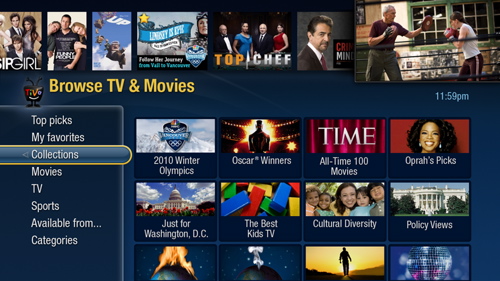
Appeals court rules redesigned EchoStar box still infringes on TiVo's DVR
In a precedent-setting win for the company perceived as the originator of "time-shift" video recording, the Federal Circuit Court of Appeals has fully affirmed a lower court's judgment that satellite service provider EchoStar's software continued to infringe upon TiVo's patents even after making significant changes to address its complaints. This despite what EchoStar (whose DVR boxes are also used by former sister company Dish Network) had called "Herculean" efforts to steer clear of TiVo's intellectual property, and a preliminary US Patent Office rejection last August casting doubt on the validity of TiVo's patents.
At issue was whether EchoStar modified the software for two of its recorders, called the 50X and Broadcom series (the latter named after the supplier of its key hardware), in such a way that it didn't store video in a stream similar to TiVo's patented methodology. Last June, after a jury found in favor of TiVo on the infringement charge, a US district court slapped an injunction on EchoStar and Dish Network boxes. EchoStar did not appeal that injunction, and it may have thought it wasn't really enforced while courts jostled back and forth over possible penalties. That prompted TiVo to move the district court to find EchoStar in contempt. It did, and today the Appeals Court upheld that finding.

Hands-on with Gesture Search for Android 2.0
Devices running Android 2.0 and later can now download from the Android Market the Google Gesture Search lab, an application which recognizes letters drawn on the touchscreen and uses them as live in-phone search terms.
The standalone application can search your contacts, browser bookmarks, installed applications by name, or music by artist name, album name or track name, all queries are limited to within your device, and do not yet reach deeper into applications for Web or content searching.

Will the smartphone replace the PC in three years?
It's the question to ask after the bold statement made yesterday by Google's John Herlihy. According to Silicon Republic, Herlihy told Digital Landscapes conference attendees that: "In three years time, desktops will be irrelevant. In Japan, most research is done today on smartphones, not PCs."
My answer is an easy "Yes" for desktops, assuming Herlihy meant desktop PCs. Mobile PCs will take longer -- not much, unless 3G radios come to be standard equipment on most laptops; that's for displacement, not irrelevance. Yesterday I asked Betanews readers: "Has your smartphone changed your life?" The smartphone most certainly will change your life if it displaces the PC. How much more dramatic will be the change whenever PCs should become irrelevant?

RealDVD permanently banned in US, Real pays Hollywood $4.5 million
The battle over RealNetworks' DVD copying software, called RealDVD, has finally come to a close, and Real has lost.
Judge Marilyn Hall Patel of the United States District Court, Northern District of California ruled today in favor of the DVD Copy Control Association, who argued that RealDVD actually made illegal copies that violated the Content Scramble System (CSS) license agreement.

$1 billion takeover bid may mean the end of Novell's makeover addiction
Yesterday's surprise $1 billion buyout offer for Novell from the New York-based private investment group Elliott Management came with a letter, made public yesterday, spelling out the investors' goal for the company. "Novell is a long-established company that we have followed closely for a considerable period of time," the firm wrote. "Over the past several years, the Company has attempted to diversify away from its legacy division with a series of acquisitions and changes in strategic focus that have largely been unsuccessful. As a result, we believe the Company's stock has meaningfully underperformed all relevant indices and peers."
If by "the past several years," Elliott meant "the dawn of time," it may very well have been accurate. Novell is a company that, in many people's minds, is defined by its propensity towards strategy shifts. Elliott Management's members collectively own 8.5% of Novell common stock. If their proposal ends up being approved, Novell's strategy could shift again -- this time, very dramatically. And if you can interpret their message as a signal of disappointment in Novell's inability to focus on its fundamentals, then you may see the possible result of all this: a divestiture of Novell's stake in SUSE Linux, the world's #2 Linux distribution.

A group of Silicon Valley geeks try to bring about immigration reform with the Startup Visa Act
At the end of February, Senators John Kerry (D - Mass.) and Richard Lugar (R - Indiana) introduced the Startup Visa Act of 2010, which will let immigrant entrepreneurs earn a two-year visa if they get at least $250,000 in venture capital investment, and then earn them legal US residence if that startup creates five or more new jobs, gets a second round of funding of over $1 million, or nets $1 million or more in revenue.
"Global competition for talent and investment grows more intense daily and the United States must step up or be left behind," Sen. Kerry said in introducing the bill. "Everywhere Dick Lugar and I travel for the Foreign Relations Committee, we see firsthand the entrepreneurial spirit driving the economies of our competitors. Creating a new magnet for innovations and innovators to come to the United States and create jobs here will offer our economy a double shot in the arm -- robust job creation at home and reaffirmation that we're the world's best place to do business."

Steve Ballmer talks Bing, Google, Xbox and Windows Phone
For anyone that missed Microsoft CEO's Q&A during the Search Marketing Expo West yesterday, a transcript is now available online. I went through and picked out key quotes, so that you don't have to read the whole thing.
Several things stand out from Ballmer's comments:

Exclusive Video: In-depth with TiVo's new Premiere interface
Though it's still technically a work in progress, TiVo's new higher resolution interface lets the Premiere DVR take better advantage of your HDTV. We sat down with TiVo's Director of Product Marketing, Bob Poniatowski to take a look at all the new features.

Hulu 'losing' Stewart and Colbert is only a big deal to Hulu's ad revenue
Hulu has been increasing in popularity, and its ads are getting more valuable, but two of the video site's most popular shows, The Daily Show with John Stewart and The Colbert Report, are being pulled.
Hulu, a joint venture between NBC Universal, the Fox division of News Corp., and now the ABC division of Disney, now racks up over a billion video views per month. (Viacom was at one time merged with CBS, the proprietor of TV.com, but is now separate.) Viacom is removing the two shows from Hulu at the end of the day on March 9, after having been available on the popular site for a little less than two years.

Has your smartphone changed your life?
That's the question I pose to Betanews readers on this fine Spring afternoon. If "Yes" then please further answer: How has your smartphone changed your life?
I'm raising the questions today because of AFP news story "Australia is social networking capital of the world." (Mike Cherng tweeted the story -- my thanks to him.) Reporter Amy Coopes quotes Danielle Warby: "My smartphone changed my life. Serious. It has my calendar, all my contacts and is an easy and intuitive communication tool."

The latest European export: Who else wants a browser 'choice screen?'
It's only been a few days since Microsoft's rollout of the browser choice screen for European Internet Explorer users. But already, the European Committee for Interoperable Systems (ECIS, not to be confused with the European Commission, a legislative body), which is credited with pressing the EC forward on the browser bundling issue, is claiming victory not just with regard to exposing users to the choice they have, but with helping to advance the developmental progress of the Web.
Now, ECIS legal counsel Thomas Vinje is calling upon other trade regulatory and legislative bodies worldwide to follow Europe's example, arguing in a statement yesterday (PDF available here) that everyone should be entitled to the same ballot.

Nokia launches Skype for Symbian^1, free 3G calls for 200 million users
It's been just over a year since Nokia first announced it would be bringing Skype to its top-of-the-line N-Series smartphones. Today Nokia announced the popular voice and text chat client is available on all Symbian^1-based devices, making free voice calls over 3G a possibility for some 200 million handsets.
The free Skype client can be downloaded from the Ovi Store. It lets users make free Skype-to-Skype calls; send and receive instant messages to and from individuals or groups; share pictures, videos and other files; receive calls through an online number; see when other Skype users are live and available; and import contacts from the native phone address book.

Up Close with TiVo's new Bluetooth QWERTY remote
Though the focus of tonight's TiVo unveiling was a new TiVo Premiere DVR, the company was especially proud of the upgrade to the remote control due out later this year. TiVo's new Bluetooth remote features a QWERTY keyboard to aid searching and finding content.
Shaped identically to the standard TiVo "peanut" remote, the new model slides horizontally to reveal a chiclet keyboard with a D-pad and a numeric keypad. This feature adds some girth to the usual remote's size and also contributes to a somewhat flimsy feel. This, however, could be due to the fact that all the remotes we handled were pre-production versions that looked to have been handled quite a bit.

TiVo details Premiere upgrade pricing for existing customers, and it's not bad
Now that TiVo has unveiled its Series 4 platform of TiVo boxes, known as the Premiere and Premiere XL, the big question for existing users is: How do I upgrade? We cornered a few executives at the launch event in New York to get the answer. And no, your existing TiVo box will not receive the new user interface.
In short, there are two separate upgrade paths. One for lifetime subscription customers and another for customers wanting to pay monthly. Why two different approaches? TiVo says its because each customer has different priorities.

TiVo revamps its UI with new Premiere DVRs, fuses Web, music, movies, and TV
For the first time in the company's history, TiVo has completely redesigned the user interface of its popular DVRs with the introduction of the new TiVo Premiere and Premiere XL. TiVo says it has "reinvented" the DVR with what it calls the "One Box," which incorporates content from the Web, movies, music, and TV into a unified library.
The problem with any media, be it print, audio, or video, is that there's simply too much content for a user to be able to casually browse it and still be satisfied by what he's seeing. That's why news aggregators are so handy, and why there's a whole industry dedicated to social media content sharing. When there's so much stuff, you need something to filter it for you.



